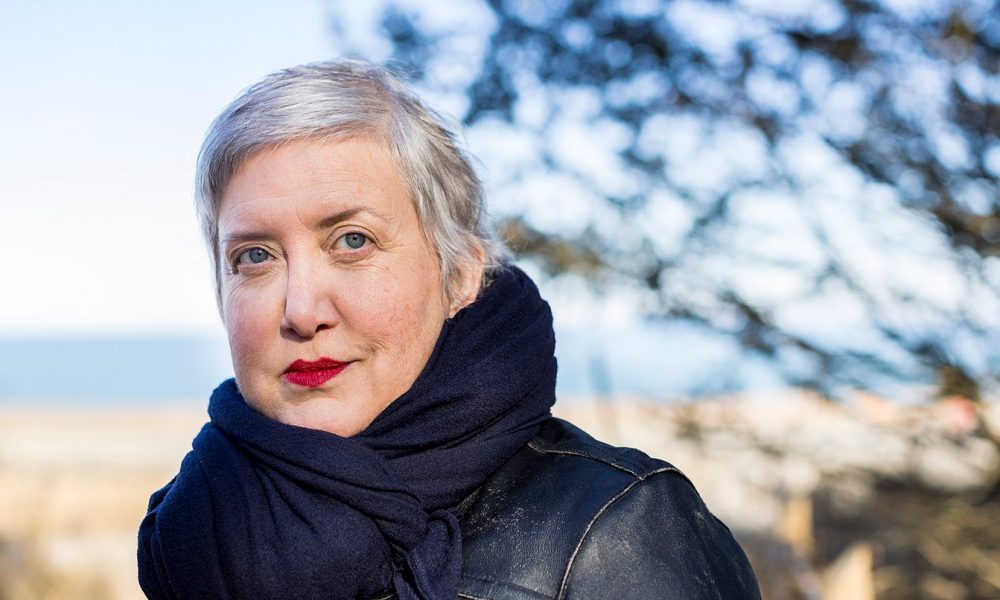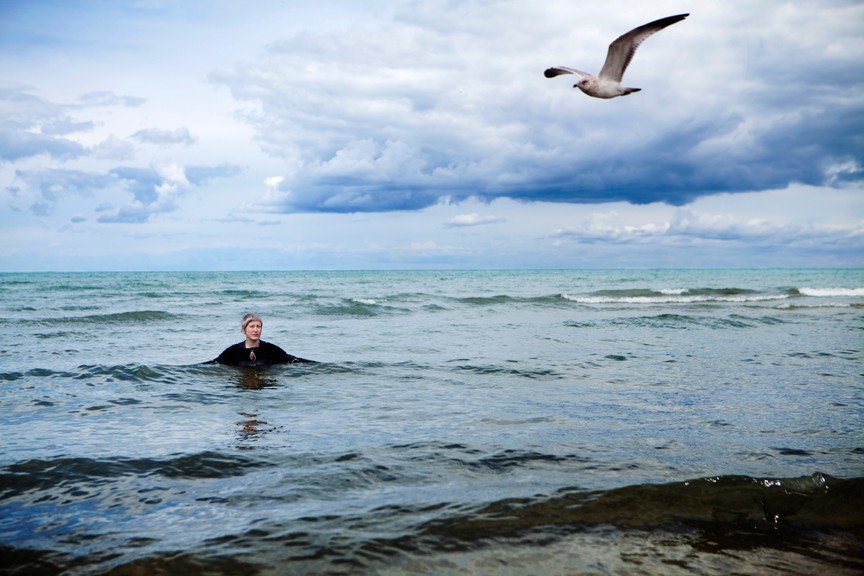

Today we’d like to introduce you to Eiren Caffall.
Eiren, we appreciate you taking the time to share your story with us today. Where does your story begin?
I moved to the Midwest after college on the West Coast and childhood on the East Coast. I never thought I’d come back to the Great Lakes, the region where my family started out. My great-grandfather was the Bishop of Michigan for the Episcopal Church, and my grandfather grew up with him in Grand Rapids. My grandmother was raised by a furniture maker in Grand Rapids and learned to swim in the summers in Lake Michigan. Even though my grandparents raised their family in New York City, they never stopped missing the Midwest.
When I saw Lake Michigan for the first time just after college, I fell in love with it. I couldn’t imagine living away from its pull; I felt like I was coming home. I moved to Chicago to live and work as a musician and writer. I lived a block away from Lake Michigan for ten years, and went to the lake every day. It has been my muse for a long time, as much as the ocean ecosystems where I was raised. In the Midwest, I found my voice as an artist. I worked with musicians to make four record albums of indie folk music as the lead vocalist and lyricist. They were all about my complicated childhood, the genetic illness I inherited, and the natural world
My mother was a hydrogeologist for the Massachusetts Department of Environmental Protection, and I learned from her about pollution, waterways, and conservation. I grew up swimming in the Atlantic Ocean, fishing in the trout streams of the Berkshire Hills, and hunting with my father, from whom I inherited an incurable kidney disease that killed most of our family before 50. When I started writing and studying, the time I spent thinking about how to protect the natural world and how to live with a terminal diagnosis came back to me, and I found my life’s work.
I now write about ecosystem loss, ecological collapse, flooding, ocean ecosystems, fire, and how people feel about and live with these losses. With my writing, I seek to help people put these huge forces into context. I want them to learn the things I know from living with a long-term, incurable disease to help them live with the losses we face in climate change and biodiversity loss. We need strategies that keep us working and fighting for the world we love, and I think that people who live with permanent illness have a lot of strategies that can help. As a person who faces my own mortality and the crises in our natural world every day, I feel deeply that we still have time to make change, especially if we come together to recognize our shared vulnerability and power and work for a better future.
I’ve survived a lot longer in good health than anyone in my family has, and I’ve done more work and had more adventures and successes than I ever expected. I know that when we believe that our lives matter, we can change our fates. I believe that when we know the same thing about steelheads or salmon or dipoeria shrimp in Lake Michigan, we can change their fates as well.
Would you say it’s been a smooth road, and if not, what are some of the biggest challenges you’ve faced along the way?
My father was sick with polycystic kidney disease by the time I was nine, and I watched him go through dialysis and two kidney transplants before 1995. We were very poor for most of my childhood, as it was hard for my father to work. My mother went back to school when I was ten and lived away from the family every weekday for several years. When she was able to find well-paying work, we were hit by extensive medical bills for my father’s care. We were just recovering from that when I was also diagnosed with PKD just before my senior year of college. I graduated with student loan debt, and my nephrologist telling me I’d likely lose kidney function by 25.
Contrary to good sense, that news made me more committed to doing what I wanted with my life. I moved to the Midwest and began my career as a musician and writer. I never had much money. I had to help my father in the last years of his life, losing him before I was 30. Before Obamacare, I was unable to buy my own health insurance, so I went without for more than four years. I’ve been through a difficult divorce, and for the last decade or more, symptoms of my PKD have left me with chronic pain, low energy, and restrictions on my diet, exercise, and ability to sing and tour as a musician.
In the face of all of that, I’ve kept making things I love. I’ve been part of a community that has helped me when I am down, has helped fund projects, and kept me remembering that I’m more than just my disease. When I was diagnosed at 22, the doctor told me I’d lose my kidney function by 25, and I’d never be able to have children. This month, my son graduates high school, and I still have full kidney function at 52.
When I was diagnosed, I thought I’d have to give up on my dreams of writing and singing. But I have four albums to my name, a gig coming up in August, writing and films in major international outlets, and my first book, a memoir about living with illness in a world in ecological jeopardy, will be published by Row House Publishing and distributed by Simon and Schuster in October 2024.
Appreciate you sharing that. What else should we know about what you do?
I am known for telling hard stories of loss and collapse that never let go of the possibility of hope and healing. I write lyrical dispatches from the apocalypse, bad news about environmental and personal challenges, but bad news delivered kindly.
I spent more than a decade as a musician, writing beautiful, melodic, complicated folk music about nature and the body, family, and love affairs, and breakups. I’ll be recording my next record, in part funded by a grant from Chicago’s 3Arts organization, later this year. They awarded me with a Make a Wave grant in 2021, funding designed to support people with disabilities, women, and people from marginalized communities.
As a writer with a chronic illness who is obsessed with nature, my work often combines memoir with science writing and lyrical observations of nature. I am interested in how our bodies and the places we love intersect. I want to find ways to tell those stories that allow people to connect with place, their lived experience, and the histories of both. We are the world around us, as integral to the natural world as bumblebees and plankton. We need to remember how nothing, not even our human lives, is separate from anything else in the world.
My essays on loss, nature, flooding, birds, marine life, and illness have appeared in The Los Angeles Review of Books, Al Jazeera, Guernica Magazine, The Rumpus, and many other publications. I have been lucky enough to have a film made of my essay Becoming Ocean. The short film, also titled Becoming Ocean, toured film festivals across America and was shown in festivals in Morocco and Amsterdam. I currently write a Substack newsletter about the natural world and living with illness, as well as continuing to publish essays.
The book that will be published in October 2024 by Row House Publishers is titled The Mourner’s Bestiary. It is a memoir that balances the story of my childhood summers on the Long Island Sound, and my motherhood summers on the Gulf of Maine, the world’s fastest-warming marine ecosystem. It tells the story of those two ecosystems, how they have been impacted by pollution and climate change, and how they are succumbing to collapse and in some hopeful cases, being brought back to life after loss. It twins those stories with my own story, first as the child of a parent with kidney disease and then as a parent with kidney disease raising a young child. It details my family’s 200-year history with the disease, finding parallels of hope in our story and the stories of the ecosystems we love.
What do you think about luck?
Lots of people with genetic illness, especially ours, think of it as a curse that they live under. But I feel I have been exceptionally lucky.
I was lucky to be born into a time when medical discoveries have been improving the treatment of my disease, extending my life by many years, and when access to alternative medicine and excellent nutrition is the norm. I have been lucky to live in a city with excellent research hospitals and to find my nephrologist, one of the lead researchers on my disease. She helped bring to market the first drug to treat my illness, a drug I currently take called Tolvaptan. The drug isn’t a cure, but it can slow the disease progression by up to 30% and reduce the chronic pain from the disease. I feel lucky every morning when I take it.
But luck also comes in the form of being in great places at the right time. I moved to Chicago at the height of the 90s music scene and was able to play at venues like Lounge Ax, Schuba’s, and the Empty Bottle on bills with people doing really excellent work. And I still play with the community of musicians I found there. I’ve been able to participate in the vibrant literary community in Chicago as well, making friends with writers doing incredible work, teaching and reading alongside people who support and promote each other in what I think of as a peculiarly Midwestern, earnest ethic of holding each other up.
When I’ve needed doors opened or required support, the doors have opened, the support has arrived. From finding the right doctors when I needed them, to community fundraisers when my health has taken a hit, to introductions to editors when my work needed a boost, to the loving support of my husband and son, every challenge has had a lucky compensation and response.
Contact Info:
- Website: www.eirencaffall.com
- Instagram: http://instagram.com/eirencaffall
- Twitter: @eirencaffall
- Other: https://eirencaffall.bandcamp.com/album/slipping-the-holdfast

Image Credits
Jacob Hand
Jason Creps











